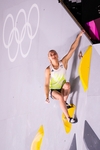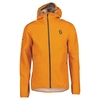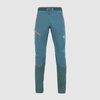Bouldering: Ronnie Dickson climbs Resident Evil 7C+

 1 / 4
1 / 4 Andrew Chao
Andrew Chao
Ronnie,7C+ boulder, first of all congratulations! And then... can you please tell us more about your "disability"?
Thanks! Yes, I hope this ascent inspires both adaptive and able-bodied climbers alike to push their own personal limits. I had my leg electively amputated above the knee at age 18. I had a congenital disorder which affected my left knee, and prevented the proper function of my knee and ankle, and also caused pain and a leg length discrepancy.
Did you already climb before the amputation?
No, I started climbing in 2007 at age 19 after hearing about the sport through an adaptive sports publication. I was in university at the time and went with a couple of room mates for the first time and was immediately hooked.
Do you climb with or without a prosthetic leg?
I started climbing without a prosthetic leg, because I did not have specialized equipment. My first 1-2 years of climbing I spent climbing like this. I got really strong, but I never realized the role that your hips and core plays in climbing until I started climbing with a prosthetic leg. I wear my prosthetic leg for climbing all of the time now, even on steep routes it helps balance my lower body out. It helps create that extra symmetry and balance even when I'm not using it actively on a hold. I'm able to occasionally conjure up some trickery and moves that even surprises me sometimes!
So mainly bouldering?
Yes, bouldering has always been my passion, but I do participate in sport climbing for both national and international paraclimbing competitions. My best finish is at the 2014 IFSC World Paraclimbing Championships where I finished 2nd in the Male Leg Amputee division.
To make matters even more interesting, we know you’re based in Florida...
Yeah, Florida has lots of water but no outdoor rock climbing. The closest area is a 9 hour drive away. I am normally able to make it out from 12-20 days a year, depending on the year.
Bouldering implies a crash pad and repeated falls... We would have thought sport climbing is better than bouldering for someone with your "disability."
I guess in many ways you can say I am the product of my environment. The first gym I started climbing at was primarily a bouldering gym. My previous sport was also soccer, where I played goal keeper, so falling never intimidated me. Also out of convenience, you can fit in so many more boulders in one weekend than you can routes, it takes less logistical preparation. The areas around Chattanooga, TN are also known for their world class boulders, so all of these factors contributed towards my growth as a climber.
I think it is all relative as far as safety is concerned. I have done multiple 20-40 foot highball boulders. I have taken a few 20 foot falls in my time as a climber. I have learned when I am over 10 feet in the air to fall like a stunt double in a movie, so to hit on my heels and crumple onto my side to absorb the impact over a broader area. Falling does not bother or intimidate me. My style does require a bigger landing area sometimes so I will carry double pads just for peace of mind. I do know that most adaptive climbers prefer sport climbing for this reason, but there is a group of adaptive athletes that prefers bouldering.
When you’re not climbing, what do you do?
I am a prosthetist at a practice in Orlando that specializes in fitting high end lower limb prosthetics for clients from all across the world. I also serve on the USA Climbing Adaptive Climbing Committee, helping promote growth and opportunities for adaptive climbers here in the United States. We are looking forward to hosting our second annual Adaptive Climbing National Championships, and are expecting 60-70 athletes from across the USA.
Last question: we know you've received great support from all climbers...
Support from the climbing community has come in many different ways. First off my main sponsor, Evolv, has been incredible in supporting adaptive climbing. They helped develop the first production model prosthetic climbing foot in conjunction with TRS Prosthetics and Paradox Sports out of Boulder, CO. They have also supported me in hosting adaptive climbing clinics all across the United States where we introduce other people with disabilities to their first climbing experience.
Secondly, all the individuals that make up our community are incredible. I could never find a way to repay all the encouraging words, good spotters, extra pads, and all of the other little gestures that other climbers extend. I am a climber who feeds of people's energy, and people get excited when they see me climb. It really makes the moment when you send special.
I don't often remember people's names, but I still remember all the times spent out at the crag. You always remember the climbs, but the people are ultimately the one's that make the experience of climbing memorable.



 Copia link
Copia link
























